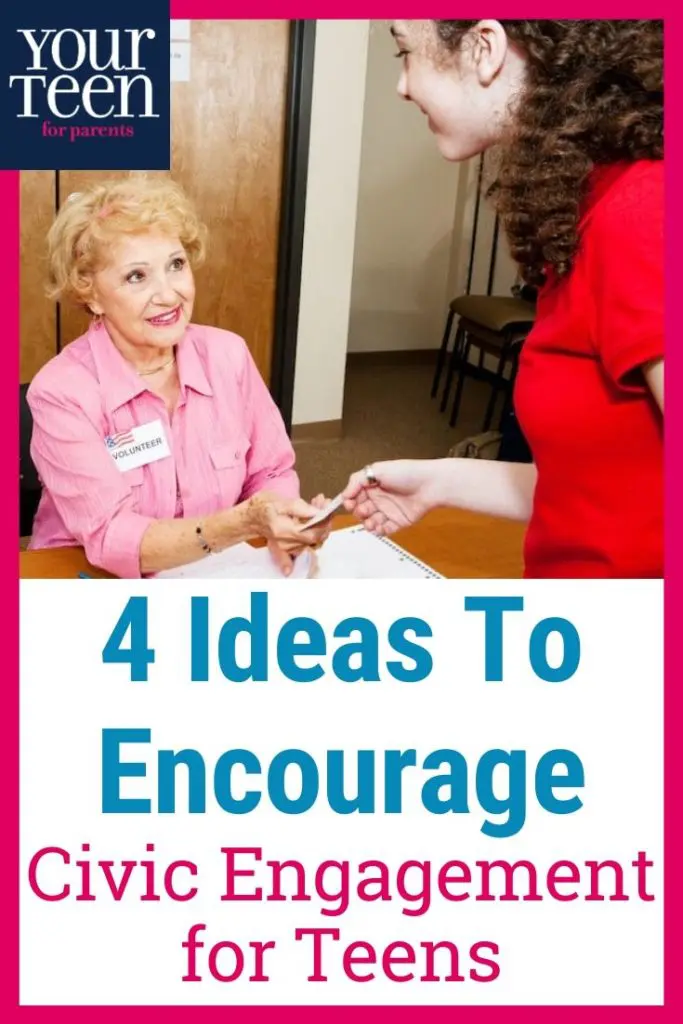We live in a politically fraught time. Helping a teenager learn to navigate current events may seem daunting. Particularly when the news often seems too complicated and too fast to keep up with, and particularly when the adults in your teen’s life might not all agree about the issues.

But we can agree that it’s important to have teenagers who are growing up to be thoughtful and caring members of their communities. Families across the political and ideological spectrum want to raise young people who care about and participate in the well being of our nation.
As parents, we know that raising healthy children is a daily challenge. Keeping our kids healthy isn’t a concern only when they are sick or visiting the pediatrician for a well-child visit. Rather, it’s a matter of paying attention to their day-to-day habits. That includes eating, sleeping, and getting exercise, to keep them healthy.
Raising a healthy democracy is similar.
We need to maintain the habits of citizenship and participation on a regular basis, not just on Election Day or when there is a crisis in our community. Maintaining a healthy democracy requires us to raise young people with the healthy habits required to maintain it.
Your teen may be taking a Civics class as part of their education. But Civics class isn’t enough. And relying exclusively on your child’s school to teach about civic participation misses an opportunity to communicate your ideals as a part of your teen’s learning.
4 Things You Can do to Encourage Civic Engagement
1. Involve your teen in voting
In many states, teenagers can register to vote as soon as they’re due to turn eighteen by the next Election Day. If your child is old enough already, stop by the local Registrar of Voters, just as you would take them to get their driving permit.
If your child isn’t yet old enough, take them with you when you go to vote. You will model civic participation. Maybe they’ll be curious enough to ask questions about why you’re voting for particular candidates. If there are ballot initiatives in your city or state, show your child the ballot and explain the issues.
If you are someone who doesn’t always get yourself to your polling place on Election Day each year, tell your child ahead of time that you’ll take them with you. That verbal commitment will compel you to go. Can’t get there because of work or travel? Pick up an absentee ballot and show it to your child.
2. Consume the news offline
If you typically get your news coverage from your social media feed, or you read news in an online newspaper, your child doesn’t know that you read the news.
From his vantage point, your time spent reading the news on your phone or laptop looks exactly the same as your time spent shopping online, scrolling through your Facebook feed, or reading your email. But if you read a physical newspaper or news magazine, that looks different.
If you listen to the news on the car radio while you’re chauffeuring your child to their extracurricular activities, they’ll hear it too. Even watching cable news on television might get their attention. It might open a conversation about the news, and you will be modeling how to stay well-informed.
3. Cross borders in your community
Many communities are diverse, if not always in the same ways. Yet often, we travel in small circles within our communities. We’re not always interacting with all of the people who live there. The neighborhoods we live in, the schools our children attend, even the stores where we shop can determine who we tend to see and interact with.
Think about the spaces in your community where people step out of those small circles. Cross the imaginary borders that exist between parts of the community. Perhaps there is a public transportation system in your town or city that everyone has equal access to. Or perhaps the public library is where many different kinds of families and individuals gather. Maybe there’s a place of worship that holds a public or interfaith service you could choose to attend as a learning experience.
Try stepping out of your circles and crossing those borders more often with your kids. And talk about the ways diversity enriches your community.
4. Model empathy
Finally, our democracy depends on occasionally considering someone else’s perspective, even when we disagree. But empathy does not always come naturally. Particularly to teenagers who are struggling daily to figure out who they are and what they believe in.
When your teenager talks about an issue—even a personal one rather than a political one—practice empathizing with the other side. Are they complaining about an “annoying” classmate or an “unfair” teacher? Talk about what the other person might have been thinking that led to the choices in the situation at hand.

Some of these actions might not seem related to politics or the country. But they are essential habits of good citizenship in our communities. Keeping these actions in mind will help your teenagers to slow down, be thoughtful, consider others, and think of themselves as important participants in their communities—and the country they are inheriting from us.





